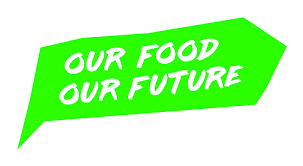
https://ourfood-ourfuture.eu/action-week-foodtest/#subscribe-petition
WE ARE #OURFOODOURFUTURE
“Our Food. Our Future” brings together 16 civil society organisations in 13 countries and 7 national Financial Support to Third Parties (FSTP) partner countries across Europe and the world. We will build a strong coalition of young people across Europe and work together in the pursuit of our common vision: A socially just and sustainable food system. A food system, which is human rights-based and agroecological. A system in which food sovereignty and migrant workers’ rights have become reality.
Certain foods are harmful and destructive. You can help change this: Support a strong EU supply chain law
Most of the food we buy in the supermarket is contaminated with human rights abuses and environmental destruction. Yet, these tasteless ingredients often remain invisible to us. With every bite we take, we enable the exploitation of workers, pesticide poisoning of soil and groundwater, or land grabbing from local populations. All of this happens so that big corporations and supermarket chains can produce food even faster, bigger and cheaper. Women and migrant workers are among those hit hardest by harmful business practices along our food supply chains. Although workers and women play an important role in food production, they are often unable to adequately feed themselves and their families, they have insecure legal status or face discrimination.
Find out which invisible ingredients are hidden in our food! Learn more about the problems they cause and why a strong Europe-wide law is a solution you should contribute to!
Binding regulations are key to guaranteeing decent working conditions and to ensure environmental and climate protection: they can make companies responsible and hold them accountable for the harm they are causing along their supply chains! A strong EU Regulation would harmonise laws across EU Member States and create a level playing field for all actors, in which the protection of human rights and the environment is mandatory. Creating a supply chain where the existing problems can’t even arise in the first place. Especially vulnerable groups who are in a poor position to stand up for their own rights need special protection. These include migrant workers, especially women and children, but also small landowners. They suffer disproportionately from the exploitative business practices of companies...
To hold businesses accountable we demand a strong mandatory human rights due diligence legislation. Because of the magnitude of human and labour rights violations, environmental destruction as well as land grabbing and forced displacement along their supply chains, agri-food companies should be classified as high-risk enterprises. We must spare no effort to ensure living wages and incomes, securing freedom of association and collective bargaining, comprehensive health and safety practices, secured legal status as well as protection against gender-based discrimination – especially for migrant workers, women and small holders. The process to draft this European regulation started in April 2020. In March 2021, the European Parliament adopted a report supporting ambitious and strong due diligence standards. It is now up to Commissioners Didier Reynders (Justice) and Thierry Breton (Internal Market) to draft a proposal for a Directive. The voice of Vice President of the European Commission for Values and Transparency, Věra Jourová, will also carry extraordinary weight here.
Now it’s up to us: Write to Commissioners Reynders and Breton, and to Vice President Jourová. Tell them that we must protect human rights and the environment NOW with strong due diligence legislation! NO MORE DELAYS!










Add new comment